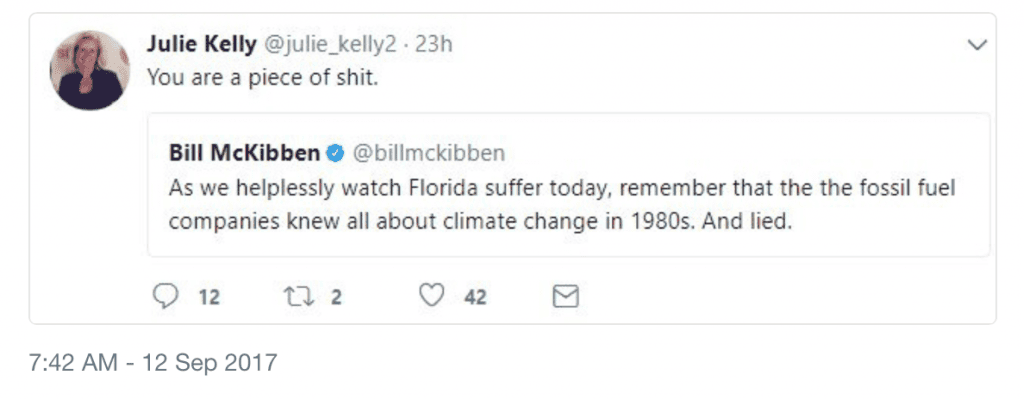Julie Kelly is a food writer and cooking instructor who emerged in 2015 as a fierce advocate for the agrichemical industry, with articles defending pesticides, arguing against GMO labeling and attacking the organic food industry. Her work has appeared in the National Review, The Hill, Huffington Post, the Wall Street Journal and Forbes.
An award-winning investigative series in Le Monde described Julie Kelly as a “propagandist” who played a role in industry-coordinated attacks on scientists who raised cancer concerns about glyphosate.
Kelly has not disclosed her funding sources. Julie Kelly’s husband, John Kelly Jr., is a lobbyist for the agribusiness giant ADM, among other corporate clients including Blackstone and CVS; and government clients including DuPage County where Julie Kelly formerly worked as a policy consultant to county board chairman Dan Cronin.

Articles Deleted from Forbes
In August 2017, Forbes deleted articles by Julie Kelly that share a byline with Henry I. Miller, a former Hoover Institution fellow, following revelations that Monsanto ghostwrote an article attacking the International Agency for Research on Cancer, which Miller published under his own name in Forbes. (Miller now works for the corporate front group American Council on Science and Health.)
The New York Times reported on Aug. 1: “Documents show that Henry I. Miller asked Monsanto to draft an article for him that largely mirrored one that appeared under his name on Forbes’s website in 2015. Forbes removed the story from its website on Wednesday and said that it ended its relationship with Mr. Miller amid the revelations.”
Retraction Watch further reported: Forbes “has pulled down all of Miller’s articles on its site, because he violated the terms of his contract” which calls for authors “to disclose any potential conflicts of interest and only publish content that is their own original writing.”
The emails, posted here, show how corporations work with with writers like Miller to promote industry talking points while keeping their collaborations secret. In this case, a Monsanto executive asked Miller to write a column and provided him with a “still quite rough draft” as “a good start for your magic.” The rough draft appeared a few days later, largely unchanged, under Miller’s name in this Forbes column.
Kelly and Miller have co-written at least a dozen articles together, promoting pesticides, arguing for deregulation and attacking the organic industry. Kelly articles removed from the Forbes website include, among others: “Federal Subsidies to Organic Agriculture Should be Plowed Under” (7.12.17), “Will the Trump Administration Usher in an Era of Less Cronyism and Pay-to-Play?” (11.16.16) and “How Organic Agriculture Evolved from Marketing Tool to Evil Empire” (12.2.15).
Inaccuracies
A July 12, 2017 article attacking the organic industry — removed from the web by Forbes because of the co-byline with Henry I. Miller — Kelly and Miller cited an Academics Review report attacking the organic industry as a reputable, independent source. Documents show Academics Review was set up as a front group with the help of Monsanto and with industry funding to attack the organic industry and critics of GMOs.
A Dec. 2, 2015 article in Forbes co-written by Kelly and Miller falsely claimed that University of Florida Professor Kevin Folta “turned over almost 5,000 emails” in response to pubic records requests, “only one of which showed any connection with Monsanto.” In fact, the New York Times posted 174 pages of Folta’s emails showing many interactions with Monsanto and Ketchum, the agrichemical industry’s PR firm.
Kelly has claimed, inaccurately, that genetically engineered foods lead to lower pesticide use and create huge advantages for farmers; in fact, GMOs have led to higher overall herbicide use due to herbicide-tolerant GMO crops and farmers have experienced many problems.
Climate science and pesticide risk denial
Julie Kelly’s work includes:
Casting doubt on the science of climate change in the National Review
Attacks on climate activists, for example tweeting to Bill McKibben, “You are a piece of shit.”

Calling on Congress to defund the International Agency for Research on Cancer, the World Health Organization’s cancer research arm, in The Hill.
Kelly’s frequent co-author Miller was a member of the “scientific advisory board” of the now-defunct George C. Marshall Institute, which is famous for its oil and gas industry funded denials of climate change. In articles co-bylined with Miller, Kelly has:
- Argued that organic farms are “an affront to the environment”;
- Promoted DDT as an effective pesticide that should not have been banned, and argued that “green zealots” and “ignorant ideological activists” could ruin the food supply by pressuring EPA to ban Monsanto’s glyphosate;
- Described the Trump Administration as likely to usher in an era of “greater governmental transparency and accountability, and a more level playing field” that could be a huge boon to the GMO industry.
The Hoover Institution, which promotes Kelly’s work, has a mission to “limit government intrusion into the lives of individuals.” Its top funder, the Sarah Scaife Foundation, was identified in a 2013 Drexel University study as among “the largest and most consistent funders of organizations orchestrating climate change denial” and a foundation that promotes “ultra-free-market ideas in many realms.”
Chemical industry allies
USRTK has compiled a series of fact sheets about writers and PR groups the agrichemical industry relies on to manufacture doubt about science that raises concern about risky products and argue against environmental health protections.
– Why You Can’t Trust Henry I. Miller
– Why Forbes Deleted Some Kavin Senapathy Articles
– The American Council on Science and Health is Corporate Front Group
– Jon Entine of Genetic Literacy Project: The Chemical Industry’s Master Messenger
– Trevor Butterworth / Sense About Science Spins Science for Industry
– Does Science Media Centre Push Corporate Views of Science?
Follow the USRTK investigation of Big Food and its front groups: usrtk.org/our-investigations/









